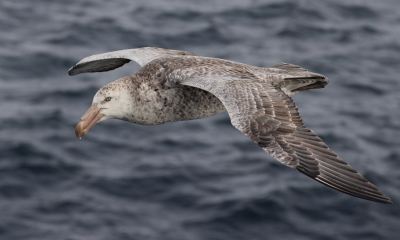
Northern giant petrel (Macronectes halli) in flight. Credit: Alastair King
Historic observer programmes
In addition to current observer programmes, MRAG has also managed shorter-term observer programmes created for specific purposes. These have included:
BIOT offshore observer programme
- Prior to the 2009 designation of the British Indian Ocean Territory (BIOT) as a Marine Protected Area (MPA), MRAG implemented the BIOT offshore observer programme. Over a period of three years, observers were placed on the BIOT Patrol Vessel (BPV) to collect data on catch and operational details. MRAG continues to supply a Senior Fisheries Protection Officer (SFPO) to BIOT.
Provision of an observer for the St Helena pole and line fishery
- In 2013 an observer was provided to a pole and line vessel conducting a single exploratory fishing trip. Data were gathered to assess the status of stocks of tuna and tuna-like species around St Helena.
Marine mammal and seabird observation for a survey of the North Falkland basin
- MRAG provided observers for marine mammal observations and seabird surveys carried out during a 3D seismic survey in the North Falkland Basin by the survey vessel Polarcus Asima, on behalf of Argos Resources and Rockhopper Exploration. 1,310 hours of marine mammal, and 308 hours of seabird observation were carried out according to standardised JNCC (Joint Nature Conservation Committee) protocols.
Projects related to observer programmes
In addition to the direct management and implementation of observer programmes, MRAG applies this experience to projects related to observer programmes, such as the development of training courses and independent reviews of observer programmes. Examples include:
Provision of advice about CCAMLR to vessel operators and crew
- MRAG designed and presented a training module about CCAMLR conservation measures and the role of observers for the toothfish vessel operator, Antarctic Sea Fisheries, in 2018. The training was designed to enhance the understanding of the operator and crew of the steps needed to maintain full compliance with CCAMLR conservation measures
Observer programmes: Best practice, funding options and North Sea case study
- In 2004, MRAG conducted a review of observer programmes for the World Wide Fund for Nature (WWF, known as the World Wildlife Fund at the time of the project), in order to identify best practice examples for incorporation into a ruleset for a generic observer programme. Eleven observer programmes, selected to give a wide scope across the industry, both in terms of scale (artisanal to large scale industrial) and management objectives (compliance, management or scientific), were reviewed. In addition, the North Sea whitefish fishery was used as a specific case study.
Indian Ocean bycatch observer programme
- On behalf of ISSF (International Seafood Sustainability Foundation), MRAG conducted a literature review in 2012 of the information available to characterise bycatch taken by coastal states in the Indian Ocean, focussing on the gillnet fleets of India and Sri Lanka. Local site visits were also used to gather grey literature and interview key stakeholders in the industry.
Study on improvements for the analysis and exploitation of observer reports in EU fisheries from NW Africa waters
- MRAG contributed towards a study of the reports and data gathered by observers working on board EU vessels operating within the EEZs of Guinea-Bissau, Senegal, Mauritania and Morocco. The reports were being analysed to identify the effectiveness of the data collection protocols and observer programme implementation, with the aim of producing a standardised manual and training workshop for these programmes
Development of ICCAT specific Port inspection Training modules
- MRAG contributed towards the production of a training manual and developing a workshop for port inspectors working at ports within ICCAT waters. The emphasis is on ICCAT specific issues, to provide port inspectors with the knowledge necessary to detect and prevent the landing of illegally caught fish in Atlantic ports.
Electronic monitoring systems (EMS) on fishing vessels
- MRAG is becoming increasingly involved in the burgeoning field of electronic monitoring, which can provide a useful adjunct to traditional human fisheries observers. MRAG has worked on projects analysing the business case for installing EMS on Ghanaian fishing vessels, an evaluation of ISSF standards for EM and a multi-phase audit of an EMS against these standards. This project included a ground truthing observer trip with comparative analysis conducted, and an evaluation and design of an appropriate EMS to monitor the landing obligation on Irish pelagic trawlers and polyvalent vessels.
- Log in to post comments
